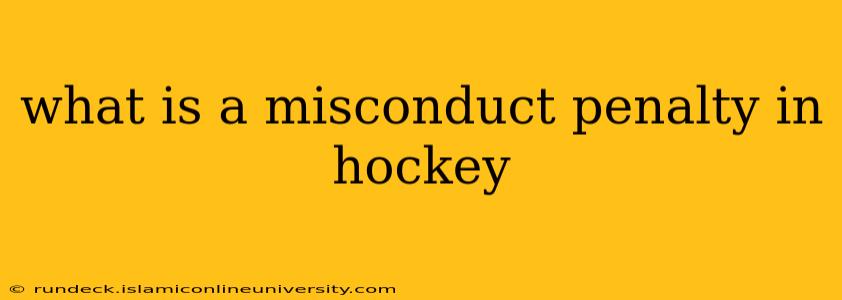What is a Misconduct Penalty in Hockey?
In hockey, a misconduct penalty is a penalty assessed for unsportsmanlike conduct or actions deemed detrimental to the game's integrity. Unlike minor or major penalties that result in a player sitting in the penalty box for a specific time, misconduct penalties serve primarily as disciplinary actions. They don't directly affect the game's flow in terms of short-handed play, but they carry significant consequences for the offending player and team. This guide will break down everything you need to know about misconduct penalties.
What Actions Result in a Misconduct Penalty?
The range of actions that can lead to a misconduct penalty is quite broad, leaving much to the discretion of the referee. Generally, however, they are assessed for infractions considered serious breaches of sportsmanship. These include:
- Unsportsmanlike conduct: This encompasses a wide range of behaviors, such as arguing with the referee, excessive celebrating, taunting opposing players, or displaying unsportsmanlike behavior towards the opposing team, fans, or officials.
- Fighting: While fighting itself usually results in a major penalty, a misconduct penalty might be added if the fight is particularly egregious or involves excessive aggression beyond the initial altercation.
- Leaving the players' bench without permission: This is a common infraction, especially during a scrum or fight.
- Abuse of officials: This includes verbal or physical abuse directed at referees, linesmen, or other officials. This is a serious offense with potentially severe consequences.
- Delay of game (in some circumstances): While a delay of game is often a minor penalty, repeated or egregious instances could also result in a misconduct penalty.
- Entering the ice illegally: This applies mainly to bench staff.
How Long is a Misconduct Penalty?
Unlike minor or major penalties that have specific time durations, a misconduct penalty doesn't have a set time in the penalty box. The player is removed from the game for the remainder of the period. They can return to the bench at the start of the next period.
What are the Consequences of a Misconduct Penalty?
The consequences of a misconduct penalty can extend beyond simply sitting out the rest of the period.
- Game Misconduct: A game misconduct is a type of misconduct penalty that results in the player's ejection from the game. They cannot return for the remainder of the game.
- Suspensions: Depending on the severity of the misconduct and any prior infractions, a player might face a suspension for future games. Repeated misconduct penalties often lead to further disciplinary actions.
- Fines: Leagues may impose fines on players who receive misconduct penalties, particularly if the infraction is deemed severe or repetitive.
- Reputational damage: Receiving multiple misconduct penalties can negatively impact a player's reputation, affecting their opportunities and potential endorsements.
What is the difference between a Misconduct and a Major Penalty?
A major penalty results in a player spending a significant amount of time (typically 5 minutes) in the penalty box. The team plays shorthanded for this duration. A misconduct, however, results in removal from the game for the remainder of the period but does not affect the team's on-ice strength. The key difference lies in whether the penalty directly impacts the team's numerical advantage on the ice.
Can a player be penalized for both a misconduct and another penalty simultaneously?
Yes, a player can receive multiple penalties at once. For example, a player might receive a major penalty for fighting and a misconduct penalty for unsportsmanlike conduct during or after the fight. The penalties are served concurrently.
What happens if a coach receives a misconduct?
Coaches can also receive misconduct penalties for various actions, such as arguing with officials or showing unsportsmanlike conduct toward the opposition. The consequences for a coach's misconduct can include ejection from the game, fines, and potential suspension.
Understanding the nuances of misconduct penalties in hockey requires awareness of the broad range of actions that can lead to this disciplinary measure. The potential consequences, from game ejections to suspensions and fines, highlight the seriousness of these penalties and the importance of maintaining appropriate conduct throughout the game.
